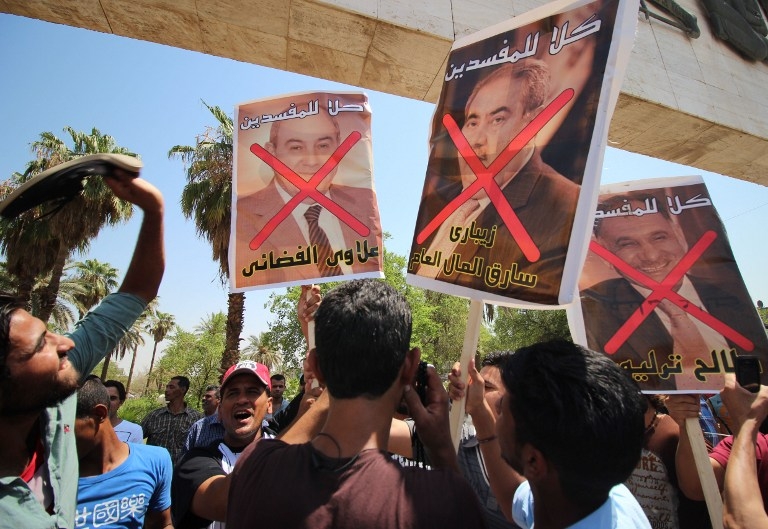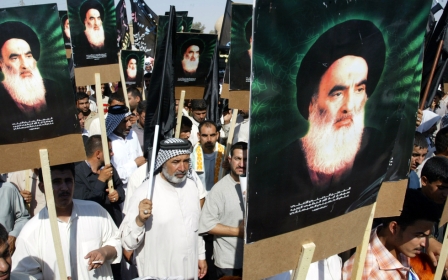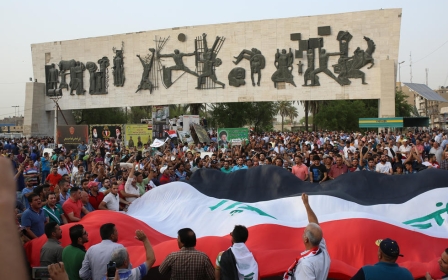Iraq anti-corruption drive may only hit scapegoats

Iraqi Prime Minister Haidar al-Abadi has so far reacted swiftly and decisively with his new anti-corruption campaign. Cynics can legitimately argue that he is acting out of opportunism and political calculation rather than principle, since his campaign against a long-festering, deep-rooted problem comes almost a year into his tenure.
Indeed, it follows recent large-scale public protests in Iraq's Shiite heartlands - Abadi's support base - that led to the country's top Shiite cleric Ali al-Sistani urging the prime minister to take "drastic measures," and to "strike with an iron fist" against corruption.
However, Abadi has gone further and faster than many expected - amounting to what Reuters described as "the biggest shakeup in [Iraq's] governing system since the US military occupation" - and has so far handled a difficult situation shrewdly.
Reforms that would have previously been staunchly and widely opposed are being outwardly embraced, even by those in the political crosshairs. For example, high-level officials who have already been dismissed have so far accepted their fate willingly - not exactly a hallmark of Iraqi politics.
That is not necessarily an endorsement of Abadi or his reforms, which were passed unanimously by a notoriously fractured parliament. Rather, it is a realisation of the political and electoral costs of opposing them, given Sistani's endorsement and the level of public anger over corruption.
In that respect, Abadi has accurately read the national mood. However, in the rush to line up behind a clearly popular and valid cause, there is a danger of glossing over the potential obstacles and consequences of the reform package.
Abolishing posts
Perhaps most strikingly, Abadi has moved to abolish the three posts of vice-president and the same number of deputy prime ministers. This, and the elimination of other cabinet posts by combining certain ministries, undoubtedly contributes to whittling down an infamously bloated governing system that lends itself to corruption.
It avoids accusations of sectarianism because all three of the country's largest sects are represented in those eliminated posts. However, Faisal al-Yafai, chief columnist at The National newspaper, says the move may actually increase sectarianism.
"Iraq's sectarian allocation was a reaction to the years of Sunni domination – perhaps Saddam domination would be more accurate – and the marginalisation of Iraqi's majority Shia population," Yafai wrote. "By removing those checks and balances, the change to the sectarian system could in fact entrench sectarianism across the board."
In abolishing various posts, Abadi potentially avoids accusations of political favouritism by calling for senior political posts not be based on sectarian or party quotas, and for a number of government positions to be filled by independents. Furthermore, former Prime Minister Nouri al-Maliki - who is to lose his current position as vice-president - is from the same party as his successor.
The removal of such a divisive figure benefits Abadi, not least because days prior to the launch of the anti-corruption campaign, Deputy Prime Minister Bahaa al-Aaraji - who resigned on Monday - accused the Maliki administration of wasting some $1 trillion of public funds.
"There are no final accounts to know how these funds were spent, and there are also no projects or any achievements that can show how this money was used," Aaraji said.
However, eliminating these posts could serve to tighten Abadi's grip on power, something that cannot be dismissed in Iraq or the wider Arab world. That his reform package gives him greater powers - some analysts say too much - is a potential cause for concern. As the saying goes: "Power corrupts."
Even the removal of Maliki may be seen as a power play by Abadi, with the former prime minister still wielding significant influence amid accusations of undermining his successor in a bid to return to power.
It can argued that Abadi needs to consolidate central authority in a fractured country, particularly in light of the fight against the Islamic State (IS). However, it is the norm for Arab leaders to maintain power and stifle dissent under the guise of national security.
Political limits
Abadi has suggested that he will go further in his reform drive, saying on Wednesday that he will seek a popular mandate to change Iraq's constitution. There is certainly a need to substantially tackle the chronic problem of corruption, which has been allowed to fester for too long. Transparency International has consistently listed Iraq as one of the most corrupt countries in the world, ranking 170 out of 175 last year.
However, despite the current fervour, Abadi has a steep uphill struggle. Corruption has been "exacerbated by the historical legacy of the previous authoritarian regime, lack of experience in the public administration, weak capacity to absorb the influx of aid money, sectarian issues and lack of political will for anti-corruption efforts," said Transparency International.
Previous anti-corruption measures have been ineffective due to "political interference, lack of political will, a weak civil society, a confusing penal code, and a lack of resources," the organisation added. Apart from a change in political will - and that may not last - the other causes of corruption still plague Iraq.
Abadi is likely to face increasing political and military opposition - even from loyalists - the deeper he delves into the problem, because corruption is endemic within both institutions, and because he has announced the formation of a committee not only to carry out new investigations, but to reopen closed cases. Some of those who have already resigned or been fired are to be probed.
Officials currently jumping on the bandwagon may jump off when they see that the public's attention has moved on. Abadi is not up against a handful of individuals, but an entire dysfunctional system in which institutions, parties and figures enjoy too much influence, privilege and wealth to cede them willingly or quietly.
There is also the question of how far Abadi is willing to go. His proposed reforms "challenge the very vested interests that have put him in power," wrote The Guardian's Middle East correspondent Martin Chulov. As such, Abadi may push just enough to placate the public without jeopardising his own position. Examples may be made and individuals scape-goated, but perhaps little more.
- Sharif Nashashibi is an award-winning journalist and analyst on Arab affairs. He is a regular contributor to Al Arabiya News, Al Jazeera English, The National, and The Middle East magazine. In 2008, he received an award from the International Media Council "for both facilitating and producing consistently balanced reporting" on the Middle East.
The views expressed in this article belong to the author and do not necessarily reflect the editorial policy of Middle East Eye.
Photo: Iraqi demonstrators gather in the streets of Baghdad on 14 August holding portraits of former prime minister and one of the current vice presidents Ayad Allawi (L), former foreign minister Hoshyar Zebari (C) and Iraqi Deputy Prime Minister Saleh al-Mutlaq while shouting slogans in support of reforms proposed by Iraqi Prime Minister Haider al-Abadi aimed at curbing corruption (AFP)
New MEE newsletter: Jerusalem Dispatch
Sign up to get the latest insights and analysis on Israel-Palestine, alongside Turkey Unpacked and other MEE newsletters
Middle East Eye delivers independent and unrivalled coverage and analysis of the Middle East, North Africa and beyond. To learn more about republishing this content and the associated fees, please fill out this form. More about MEE can be found here.





